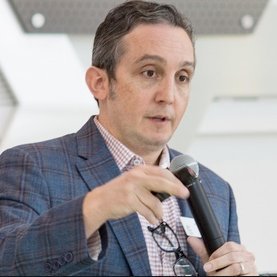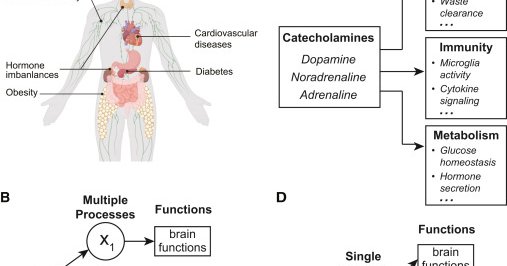
Australasian Neuroscience Society (ANS)
@AusNeuroSoc
Followers
4K
Following
3K
Media
498
Statuses
4K
The official twitter account of the Australasian Neuroscience Society. Tag us in tweets about your research! Tweets by @rockatscientist. RT ≠ endorsement
Australasia
Joined August 2015
Call for abstracts: 🔬🧬🧠Abstract submissions and registration for the #ANS2025 Annual Scientific Meeting in Hobart, Tasmania are open now! 🔬🧬🧠 Register and Submit Your Abstract Here: https://t.co/7b37gXTcst We look forward to seeing you in Hobart!
1
5
6
Find out more about #ANS2025 symposia for the Hobart 2025 meeting including "The quiet loud brain: Exploring spontaneous brain dynamics across species" here: https://t.co/9ztAE2SgYi
0
0
0
Online now: Lcn2 from neutrophil extracellular traps induces astrogliosis and post-stroke emotional disorders https://t.co/EqwwKf6nCi
0
7
44
Butenko et al. compared simple and advanced approximations of axonal activation considering the uncertainty in fibre diameters. The prominent effect of fibre diameter selection further confirmed the necessity of probabilistic approaches. Full article 👉 https://t.co/rd9FgnS3fC
0
1
2
Kollenburg et al. review the molecular mechanisms and regional activity patterns underlying headache disorders including migraine, cluster headache, and paroxysmal hemicrania. https://t.co/r5pgorlbqF
0
78
276
Do you know what 'assembloids' are? If not, you should start reading about them, as they will likely be important to the future of Parkinson's, Alzheimer's and neurodegeneration. 'Assembloids' are one of the most exciting frontiers in neuroscience. Think of them as tiny,
9
99
543
Find out more about #ANS2025 symposia for the Hobart 2025 ANS meeting including "New insights into the roles of cerebrovasculature in nutrient supply, waste removal, neurodegenerative diseases and beyond" here: https://t.co/9ztAE2SgYi
1
2
7
Find out more about #ANS2025 symposia for the Hobart 2025 ANS meeting including "The brain's neuromodulatory yin-yang: Dopamine and acetylcholine in learning and disease" here: https://t.co/9ztAE2SgYi
0
1
5
Introducing the #ANS2025 ANS Plenary Lecturer, Dr Miriam Matamales! Dr Matamales' research focuses on the neural circuits underlying goal-directed learning and how their dysfunction impairs appropriate behaviour.
0
2
2
Find out more about #ANS2025 symposia for the Hobart 2025 ANS meeting including "Cancer neuroscience: Defining and targeting neural-tumour interactions in the body and brain" here: https://t.co/9ztAE2SgYi
0
0
0
Find out more about #ANS2025 symposia for the Hobart 2025 ANS meeting including "Delineating brain regions - Importance and current methods of application" here: https://t.co/9ztAE2SgYi
0
0
0
Find out more about #ANS2025 symposia for the Hobart 2025 ANS meeting including "Modelling neurodegenerative diseases in vitro" here: https://t.co/9ztAE2SgYi
0
1
2
Congratulations to Alyssa Kristina from UniSyd for winning best talk at the Kioloa Neuroscience Colloquium 2025 supported by ANS, @ourANU @westernsydneyu @Uni_Newcastle
@ANS_Students Her talk: Displaced but not forgotten: Revealing the diversity of amacrine cells in human retina
0
0
5
Introducing the #ANS2025 Eccles Plenary Lecturer, Prof Melinda Fitzgerald! Prof Fitzgerald's leads a team of researchers and post-graduate students in nationally coordinated research focused on understanding and preventing the loss of function that occurs following neurotrauma
0
0
1
Online now: The how and why of sleep: Motor theory and catecholamine hypothesis
cell.com
This perspective examines sleep’s mechanism (“how”) and function (“why”). The motor theory posits that sleep is governed by distributed motor-control circuits; the catecholamine hypothesis identifies...
0
6
18
🚨 Early Bird Registration Extended – Now Closes 26 September! Join us in Hobart, Tasmania for the ANS Annual Meeting. Register now to take advantage of discounted Early Bird rates. https://t.co/7b37gXTcst
#ANS2025
0
0
0
@BarbFulop @QldBrainInst @mo_brainer @TheFlorey Dr Jingjing You @youjingjing from @BiovisionGroup at #USyd is launching a research program to advanced Brain-Computer Interfaces. Collaborating with experts at Fudan University 🇨🇳 , she will gain skills in electrode fabrication, neural signal collection, and AI data analysis.
0
1
1
@BarbFulop @QldBrainInst Dr. Christina Mo @mo_brainer from @TheFlorey aims to transform Brain-Computer Interfaces by focusing on translational neurotechnology. She will visit two top U.S. labs 🇺🇸 to gain expertise in real-time motor decoding and neural control of assistive devices.
1
1
3
Dr. Barbora Fulopova @BarbFulop from @QldBrainInst will explore proprioception, our body's vital sense of self-awareness. Her project at the University of Fribourg 🇨🇭 aims to develop advanced robotic systems to understand how the brain processes proprioceptive information.
1
2
4





